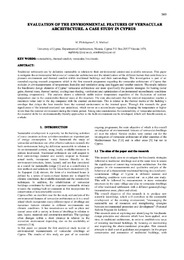| dc.contributor.author | Philokyprou, M. | en |
| dc.contributor.author | Michael, A. | en |
| dc.date.accessioned | 2013-02-15T07:59:48Z | en |
| dc.date.available | 2013-02-15T07:59:48Z | en |
| dc.date.issued | 2012-10-29 | en |
| dc.identifier.issn | 2047-4970 (Print) | en |
| dc.identifier.uri | http://hdl.handle.net/10797/6120 | en |
| dc.description.abstract | Traditional settlements are by definition sustainable in relation to their environmental context and available resources. This paper investigates the environmental behaviour of vernacular architecture and the identification of the different factors that contribute to a pleasant environment and thermal comfort within traditional buildings and their surroundings. This investigation is part of an extended ongoing research programme which is the first research programme regarding the vernacular architecture of Cyprus that includes in situ measurements of temperature, humidity and ventilation using data loggers and weather stations. The results indicate the bioclimatic design elements of Cyprus' vernacular architecture and more specifically the passive strategies for heating (solar gains, thermal mass, thermal inertia), cooling (sun-shading, ventilation) and optimization of environmental microclimatic conditions (planting, evaporation). The analysis shows a relatively stable indoor temperature regardless of the fluctuation of outdoor temperature due to the considerable thermal mass of the structure. The data also indicates that the internal temperature reaches a maximum value later in the day compared with the external environment. This is related to the thermal inertia of the building's envelope that delays the heat transfer from the external environment to the internal space. Through this research the great significance of the intermal courtyard was underlined, which serves as a microclimate regulator, keeping the temperature at higher levels than the external environment during the winter period. Taking into consideration the sustainability of vernacular architecture, the essential skills for environmentally-friendly approaches to the built environment can be developed, which will benefit society as a whole. | en |
| dc.description.sponsorship | Department of Architecture, University of Cyprus, Nicosia, Cyprus P.O Box 20537 Nicosia 1678. | en |
| dc.language.iso | eng | en |
| dc.publisher | Multi Science Publishing | en |
| dc.relation.ispartof | International Journal of Heritage in the Digital Era, Volume 1, Supplement 1, Pages 349-354 | en |
| dc.rights | info:eu-repo/semantics/openAccess | en |
| dc.subject | Sustainability | en |
| dc.subject | Thermal comfort | en |
| dc.subject | Vernacular | en |
| dc.subject | Bioclimatic | en |
| dc.title | Evaluation of the Envrionmental Features of Vernacular Architecture. A Case Study in Cyprus | en |
| dc.type | info:eu-repo/semantics/conferenceObject | en |
| dc.identifier.doi | 10.1260/2047-4970.1.0.349 | en |
